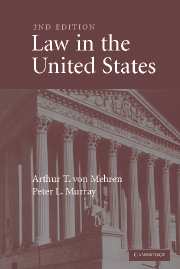Book contents
- Frontmatter
- Contents
- Preface
- CHAPTER 1 THE SOURCES OF AMERICAN LAW
- CHAPTER 2 AMERICAN COMMON LAW
- CHAPTER 3 COMPARATIVE PERSPECTIVES ON AMERICAN CONTRACT LAW
- CHAPTER 4 AMERICAN FEDERALISM
- CHAPTER 5 AMERICAN CONSTITUTIONAL LAW AND THE ROLE OF THE UNITED STATES SUPREME COURT
- CHAPTER 6 AMERICAN CIVIL JUSTICE
- CHAPTER 7 AMERICAN CRIMINAL JUSTICE
- CHAPTER 8 AMERICAN TRIAL BY JURY
- CHAPTER 9 CHOICE OF LAW, INTERNATIONAL CIVIL JURISDICTION, AND RECOGNITION OF JUDGMENTS IN THE UNITED STATES
- CHAPTER 10 THE AMERICAN LEGAL PROFESSION
- CHAPTER 11 THE UNITED STATES AND THE GLOBAL LEGAL COMMUNITY
- Index
CHAPTER 9 - CHOICE OF LAW, INTERNATIONAL CIVIL JURISDICTION, AND RECOGNITION OF JUDGMENTS IN THE UNITED STATES
Published online by Cambridge University Press: 05 June 2012
- Frontmatter
- Contents
- Preface
- CHAPTER 1 THE SOURCES OF AMERICAN LAW
- CHAPTER 2 AMERICAN COMMON LAW
- CHAPTER 3 COMPARATIVE PERSPECTIVES ON AMERICAN CONTRACT LAW
- CHAPTER 4 AMERICAN FEDERALISM
- CHAPTER 5 AMERICAN CONSTITUTIONAL LAW AND THE ROLE OF THE UNITED STATES SUPREME COURT
- CHAPTER 6 AMERICAN CIVIL JUSTICE
- CHAPTER 7 AMERICAN CRIMINAL JUSTICE
- CHAPTER 8 AMERICAN TRIAL BY JURY
- CHAPTER 9 CHOICE OF LAW, INTERNATIONAL CIVIL JURISDICTION, AND RECOGNITION OF JUDGMENTS IN THE UNITED STATES
- CHAPTER 10 THE AMERICAN LEGAL PROFESSION
- CHAPTER 11 THE UNITED STATES AND THE GLOBAL LEGAL COMMUNITY
- Index
Summary
INTRODUCTION
The broad discipline of conflict of laws – or, to use the nomenclature preferred in Europe, private international law – deals with legal problems that have significant connections with more than one politically organized society. Basically, three distinct although interrelated questions are posed: (1) in what circumstances is it appropriate for a legal order to charge its juridical institutions with the adjudication of interstate or international controversies; (2) from what source or sources are to be derived the rules and principles to regulate such controversies; and (3) in what circumstances and to what extent should a legal order accord respect locally to adjudications given in an interstate or international controversy by the juridical institutions of another sovereign? These problems are addressed by the three branches of private international law: adjudicatory jurisdiction, choice of law, and recognition and enforcement of foreign judgments. This chapter considers some important recent developments in these three areas in the United States.
The experience of the United States with conflict of laws is particularly rich because conflictual problems arise with respect to interstate as well as international situations. Generally speaking, for the most part, each state of the United States is sovereign in private-law matters. Chapter 4 discussed the federal and state court systems whose work and responsibilities overlap and interrelate in various and complex ways. State courts can apply federal law and federal courts can apply state law.
- Type
- Chapter
- Information
- Law in the United States , pp. 231 - 248Publisher: Cambridge University PressPrint publication year: 2007

